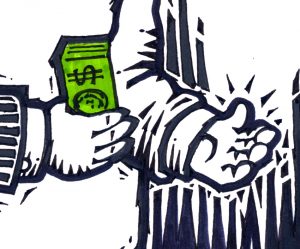By Matt Taibbi
Rolling Stone (9/14/18)
Andrew Cuomo won the Democratic primary last night [9/13] in the New York gubernatorial race, a high-profile win over celebrity actress Cynthia Nixon that has some convinced all is right in the Democratic world again. Politico is already touting Cuomo as a presidential candidate, despite the fact that he just swore he would serve four years in Albany unless “God strikes me dead.”
Cuomo won by a fair margin, by about 65 percent to 35 percent, which wasn’t exactly a surprise. He spent over $16 million in a period of six weeks this summer, or about 25 times what Nixon was spending. At various times in the campaign, Cuomo has had 50 times as much cash as his opponent.
Cuomo has always been significantly backed by real estate developers and by the finance sector, and leaned heavily on big donors. Last year, The New York Times reported that 99 percentof Cuomo’s donations since 2015 had been over $1,000. He insisted this year that this donor base had changed (although the stats seem to have been affected by shady episodes like a single donor sending in $1 69 times).
The issue that’s dividing Democrats is not marijuana legalization, or a $15 minimum wage, or body cameras for cops, or any of a dozen other things. The issue is money.
Nixon, meanwhile, boasted that some 97 percent of her donations were less than $200. She received more of these small donations in the first 24 hours after announcing her campaign in March than Cuomo had since 2011.
The Cuomo-Nixon race went according to an increasingly common pattern. One candidate takes all the money and is not just substantially supported by the very industries he or she is charged with overseeing, but also may have a corresponding lack of grassroots financial support.
Call this candidate the pole-sitter. He or she will start the race with a massive war chest, but will face the not-insignificant challenge of converting a few big chunks of money into many votes.
Meanwhile, in the newly competitive world of blue-state politics, there is more and more often a noisy progressive challenger. This person likely hails from the Justice Democrats/Our Revolution family, runs on an anti-corporate platform, and may eschew corporate money.
This candidate’s task will be the opposite: attempting to convert a foundation of small donations into the kind of widespread media saturation that’s still usually needed to win.
Another common feature of these races is that the party apparatus, rather than staying neutral, may actively campaign against the progressive challenger. …
(Commoner Call cartoon by Mark L. Taylor, 2017. Open source and free to use with link to www.thecommonercall.org )


